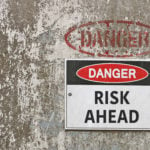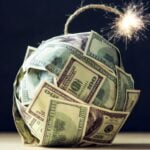
Source: pathdoc / Shutterstock.com
Editorial Note: InvestorPlace Beacon independently determines what we cover and recommend. We earn a commission from affiliate partners on many offers and links. However, these commissions do not affect our editors' opinions or evaluations. Click here to read our full advertiser disclosure.
Saving money for your future is a key part of a financial plan — but even small mistakes can derail your success. Learn about common mistakes, such as forgoing an emergency fund and paying high bank fees, and how to avoid them.
Our editorial team collaborated with a financial expert, Barbara O’Neill, Ph.D., CFP, AFC, CRPC, Owner and CEO of Money Talk. O’Neill highlighted key savings mistakes to be wary of in 2024.
1. Not Switching Banks for a Higher Rate
The national average rate for traditional savings accounts is 0.46%, according to the FDIC. But there are plenty of banks offering interest rates around 5% on savings products.
Not shopping around to get a good annual percentage yield (APY) on savings products is a common investing mistake, Barbara O’Neill, financial advisor and CEO of Money Talk, told InvestorPlace. She advises researching multiple bank rates and reviewing their different savings products, like certificates of deposit (CDs) and savings accounts.
| Did You Know? |
| A recent paper published in the National Bureau of Economic Research found that online banks tend to raise their interest rates more than brick-and-mortar banks when the Federal Reserve hikes its benchmark interest rate. |
Source: U.S. Bureau of Labor Statistics
If you have a deposit of $10,000 in a traditional savings account with a 0.46% APY, you’ll earn around $230 in interest after five years. But if you switch to an online bank offering a high-yield savings account with a 4% APY, that $10,000 deposit could earn more than $2,000 within the same time period.
But keep in mind that interest rates aren’t everything. You also want to ensure a bank fits your specific preferences, such as the ability to withdraw cash easily or get face-to-face customer service.
2. Having an Unclear Budget and Savings Goals
Not having clear financial goals that provide a reason (and motivation) to save, and lacking a budget that includes a savings component, can significantly hurt your finances, O’Neill said.
Without a clear budget, it’s easy to overspend. But setting goals for yourself and tracking your spending — like using a budgeting app to save for a new car, or tracking your expenses and setting a small amount aside every month for upcoming vacations — can help to budget and save. MyMoney.gov. has free budgeting spreadsheets, calculators and saving checklists to help you set these goals.
3. Not Building An Emergency Fund
While it’s important to save for big events like buying a house, it’s also crucial to have money set aside in case of emergencies like an unforeseen medical bill or car repair. Financial advisors typically recommend having at least enough cash to cover expenses for three to six months readily available. Investing for your future is an important part of your overall financial plan, but prioritizing investing over saving for emergencies means putting yourself at financial risk.
According to a recent study from Fidelity Investments, a lack of emergency savings is a major source of stress for Americans. Having an emergency fund can reduce stress, allowing you to make wiser financial decisions.
4. Paying Unnecessary Bank Fees
If you’ve set a budget, track your spending and diligently save, you could still get hit with bank fees, which can eat into your funds and lower the impact of all your savings efforts.
Bank accounts often come with monthly maintenance fees, non-sufficient funds (NSF) fees, out-of-network ATM fees and overdraft fees. But there are popular banks that offer free checking and savings accounts (as in, no maintenance and service fees) as well as low or no additional fees for services.
Even if banks do charge fees, you can avoid many of them. You can sign up for email or text alerts to notify you of a low balance to help you avoid non-sufficient fund or overdraft fees and only use ATMs within your bank network, for example.
Sources:
FDIC. (2024, February 20). National Rates and Rate Caps. Retrieved from https://www.fdic.gov/resources/bankers/national-rates/index.html
U.S. Bureau of Labor Statistics. (2023, November). Do Online Banks Have Bigger Reactions to the Fed’s Rate Hikes? Retrieved from https://www.bls.gov/opub/mlr/2023/beyond-bls/do-online-banks-have-bigger-reactions-to-the-feds-rate-hikes.htm
Fidelity Investments. (2023, October 12). Fidelity Research: Emergency Savings Ranked the No. 1 Savings Goal After Retirement. Retrieved from https://newsroom.fidelity.com/pressreleases/fidelity-research–emergency-savings-ranked-the-no.-1-savings-goal-after-retirement/s/3bdfd933-090c-46de-bca8-ce7355f88043



